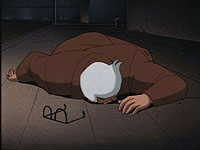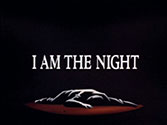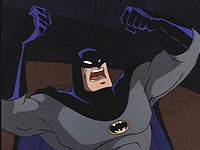|
||
|
| Credits | Cast | |
Written by Michael Reaves Directed by Boyd Kirkland Music by Michael McCuistion Animation by Sunrise |
Kevin Conroy as Bruce Wayne Loren Lester as Dick Grayson Efrem Zimbalist, Jr. as Alfred Bob Hastings as Commissioner Gordon Robert Constanzo as Bullock Melissa Gilbert as Barbara Gordon |
Diana Muldaur as Dr. Leslie Thompkins Mari Devon as Summer Gleeson Brian George as Jazzman Seth Green as Wizard Sal Viscuso as Monk Carmen Zapata as Judge Vargas |
 This is the Batman episode of the fanboys’ dreams. Which says a lot more about the fanboys than it says about Batman. This is the Batman episode of the fanboys’ dreams. Which says a lot more about the fanboys than it says about Batman.
Let me start with the positives. In Jimmy “the Jazzman” Peak and his vendetta against James Gordon, the episode has a dramatic set-up not unworthy of the Depression-era gangster films that inspired many a BTAS story. Even its incidents—such as a shoot-out at a warehouse, a prison escape, and a taut confrontation over a hospital bed—are keenly allusive of incidents in the Cagney-and-Raft canon. True, BTAS handily dramatized a similar situation in the excellent “A Bullet for Bullock,” but that episode veered more toward eccentric comedy than melodrama. BTAS never put Gordon at the center of a story until the fantasy-tinged “Over the Edge” came along, and so one hungrily anticipates a story that puts that cagey old police dog in the crosshairs. But that very intriguing situation is treated only as a backdrop in this episode. The real story, such as it is, belongs to Batman and his very vocal doubts about whether he is doing anybody any good with his nocturnal vigilantism. This, of course, is another interesting situation. Batman is driven and obsessive, but he is neither fanatical nor lawless. Victor Frieze, Jervis Tetch, and Matt Hagen (to take some obvious choices) can indulge their dreams of vengeance, but the justice-seeking Batman cannot afford the luxury of not entertaining doubts. At every moment in any fist-fight he has to weigh just how far he is willing to go to bring in his quarry, and there must be occasions when he has to pull himself back and reassess the propriety of his chosen career. "I Am the Night" is about just such a moment. This, clearly, is why Bat-fans so admire the story: it's one of the few occasions when their hero engages in overt reflection and explicitly lets us see what's going through his head. Batman is the most "psychological" of superheroes, and in "I Am the Night" he seems to wallow in a hot and steamy bath of self-criticism. But if you listen to what he actually says, it is not clear he is actually connecting with himself. He directs none of his fist-pounding rage at himself, at his quest, or at his ideals; he expresses no skepticism about whether he has actually been doing the right thing by donning the cape and cowl. He wonders only if he has been effective at his job, and he wonders whether it would not be wiser to forget the past crimes that led him down into the Batcave and to just move on. The former is less a criticism of himself than a whinge about the fact that Gotham never stays clean for very long—it's the kind of weary complaint your mother makes about your room not staying picked up. The latter is the kind of dour mood that afflicts anyone, no matter their job, at some point in their career. (One can as easily imagine Lucius Fox up in his penthouse apartment growing morbid about the attractions of corporate power after his third martini of the evening.) Nor are these doubts apparently provoked by any kind of important event: the episode's first shot finds Batman already slumped over with a frown. So "I Am the Night" is not, in fact, the story of Batman having a depressing epiphany about his life work. It is the story of a crime-fighter caught in a funk. It's a very human thing, but it's not attractive, and only an adolescent temperament would be impressed by it.
But even if the script had been less chatty, it would remain built on a gruesome trick. Aside from Alfred, Jim Gordon may be the Batman universe's warmest and most humane character. And "I Am the Night" uses his brush with death as a cheap hook to hang Batman's travails upon. Batman, of course, is only human, and his decent into selfish self-pity after Gordon is wounded is unattractive but not unexpected. But the episode's willingness to exploit the near-death of this brave officer so as to motivate scenes of hackneyed breast-beating by Batman is loathsome. There's nothing wrong with showing Batman being hamstrung by Gordon's shooting, or in having him save Gordon at the climax from the Jazzman. But a story that puts Gordon in danger should have been a story about Gordon—just as "A Bullet for Bullock" was a story about Bullock. Why do people love this episode so much? Because of the idea behind it, I suspect. Fortunately, in episodes like "Almost Got 'Im," "Beware the Gray Ghost," "His Silicon Soul," "It's Never Too Late," "Out of the Past," "Perchance to Dream," and Return of the Joker were much better at getting inside the Batman's head indirectly and with greater artfulness. |
|
|
|
Related Episodes |
What Others Are Saying ... |
| Back to House and Garden |
Forward to If You're So Smart ... |


